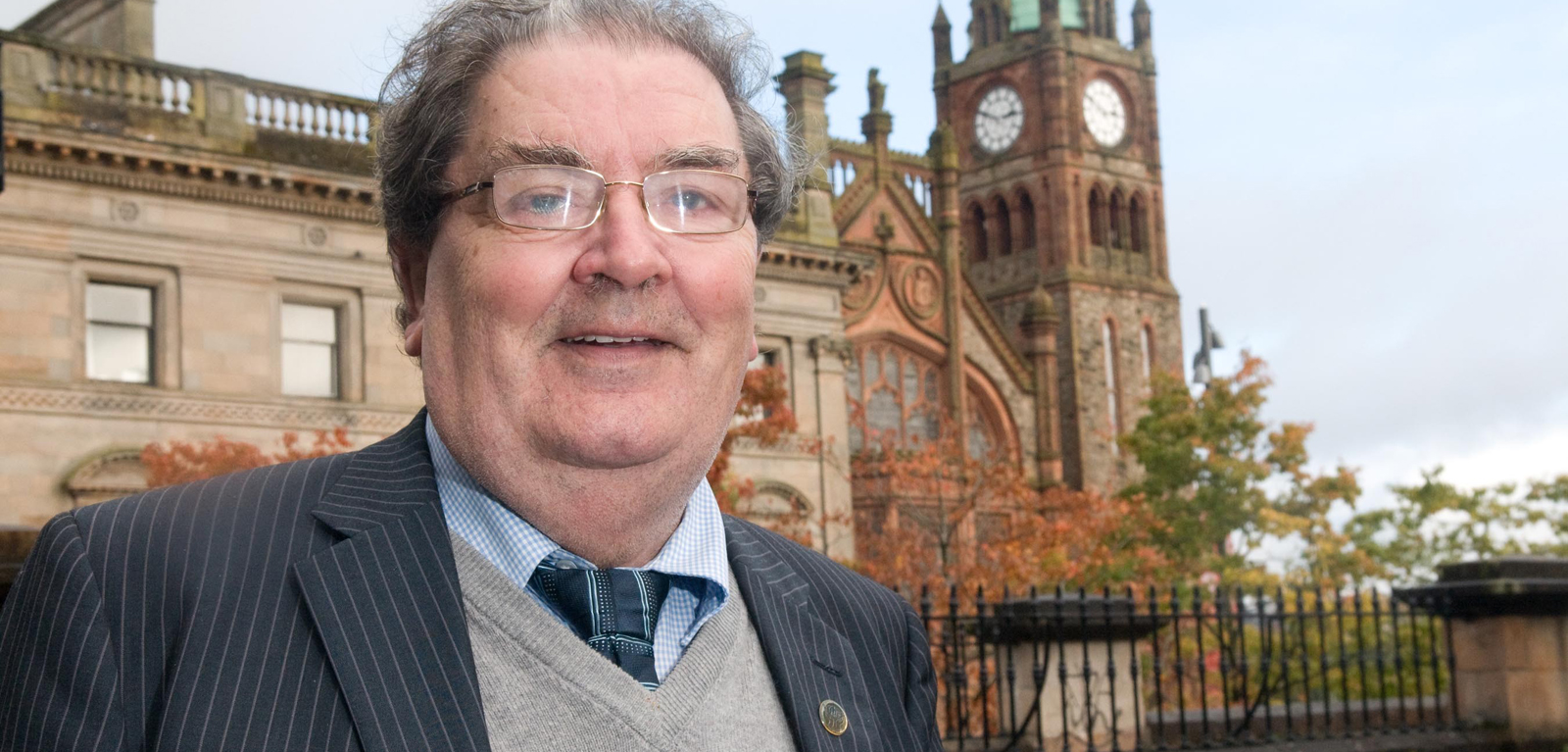Remembering John Hume
The University was saddened to learn of the death of John Hume on 3 August, 2020.

John Hume’s contribution to Northern Ireland was immense and spans the decades. His political journey was marked by courageous leadership, as well as a deep and unstinting desire to secure lasting peace in Northern Ireland.
In July 1999, Mr Hume received an honorary degree of Doctor of Laws from Queen’s University Belfast as did Seamus Mallon and Lord David Trimble, in recognition of their contribution to the Northern Ireland peace process. At the graduation ceremony, Lord Bew delivered his citation and said: “John Hume has been at the centre of political life here since the onset of the Troubles. He has dominated the epoch in a way that no other politician, British or Irish, nationalist or unionist, has.”
Dr Peter McLoughlin is a Lecturer in Politics at Queen’s University Belfast, and author of a study on Hume’s politics. Dr McLoughlin argues the historic importance of Hume: “Though many figures played a part, there is a case to make that John Hume was the single most significant actor in bringing peace to Northern Ireland. From his emergence as a civil rights leader in the late 1960s, through to his role in achieving the Good Friday Agreement in 1998, he continually preached the message of non-violence and full equality between Irish nationalist and Ulster unionist as the only way to resolve the Northern Ireland conflict. Republicans and loyalists alike opposed the basic formula for a constitutional settlement that Hume and SDLP offered throughout the Troubles – power-sharing and political structures that would link northern nationalists to the Irish state, and so recognise their national identity, just as the link with Britain did unionists. However, Hume persisted, and was able to win the support of various actors for this approach – the Irish government, the EU, and through Irish-America, even the White House. Such was the coalition of support that Hume marshalled that the British government and former unionist opponents eventually acceded to his formula – hence the Good Friday Agreement. Hume was even crucial in persuading republicans that this was the only viable option – that violence simply entrenched unionist opposition to a united Ireland, which could only be advanced by firstly bringing the two communities together to co-operate in addressing their common socio-economic concerns. Through such a process, and over time, Hume argued, deep political differences would naturally recede. The role of the EU project in healing post-war Europe was his constant reference point in this.”
In April 2018, Queen’s University Belfast held the Building Peace: The Belfast/Good Friday agreement 20 years on event, where key figures from the Belfast/Good Friday Agreement period gathered to mark the Agreement's 20th Anniversary. Although Mr Hume’s deteriorating health prevented him from attending the event, the profound impact of his leadership was widely acknowledged by both local and world leaders.
Over twenty years on from The Good Friday agreement, his contribution can still be felt in Northern Ireland. He famously said, "Politics is the alternative to war." He championed dialogue, politics, community relations, reconciliation and an end to violence. Today, Northern Ireland lives in that ‘alternative’ that was carved out by a collective commitment to tirelessly seek political solutions and pursue peace.
As an institution we are deeply appreciative of the invaluable contribution John Hume made to the building of peace in Northern Ireland and the transformational change that he brought to the University community and wider society. The University wishes to offer its sincerest condolences to Mr Hume’s wife, Pat, his family and friends.
Media
Queen's University Communications Office, 028 9097 3091, comms.office@qub.ac.uk